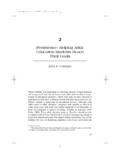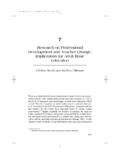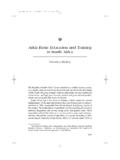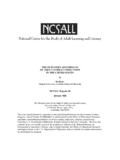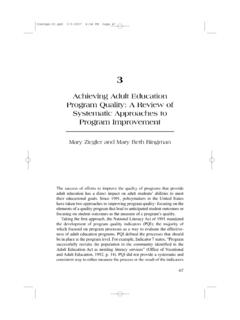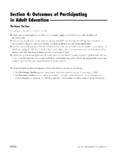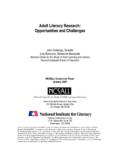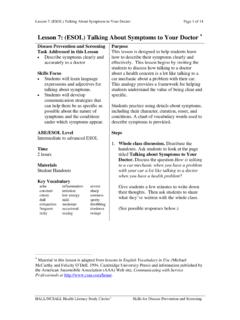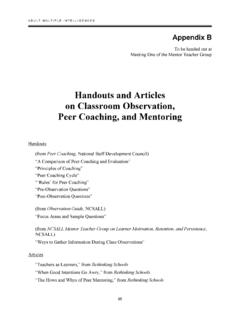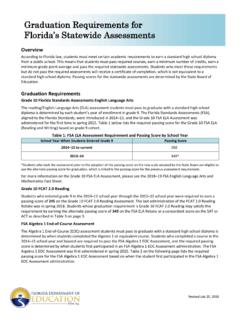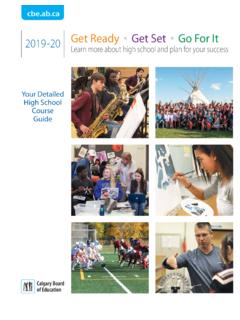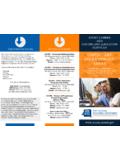Transcription of Transitioning Adults to College: Adult Basic Education ...
1 Transitioning Adults to college : Adult Basic Education Program Models Cynthia Zafft, Silja Kallenbach, and Jessica Spohn World Education , Inc. NCSALL Occasional Paper December 2006 Harvard Graduate School of Education 101 Nichols House, Appian Way Cambridge, MA 02138 NCSALL Occasional Papers are funded by the Educational Research and Development Centers program, Award Number R309B960002, as administered by the Institute of Education Sciences (formerly Office of Educational Research and Improvement), Department of Education . However, the contents of NCSALL Occasional Papers do not necessarily represent the positions or policies of the Institute of Education Sciences, or the Department of Education , and you should not assume endorsement by the Federal Education , Inc. 44 Farnsworth Street Boston, MA 02210 iii Contents TABLES .. v ACKNOWLEDGEMENTS.
2 VII INTRODUCTION .. 1 BENEFITS OF POSTSECONDARY Education AND ABE LEARNERS .. 2 CHALLENGES TO POSTSECONDARY Education AND ABE LEARNERS .. 4 Nontraditional college Students .. 4 college Students with a GED .. 5 Underprepared college Students .. 6 PREVIOUS WORK ON STRATEGIES OR MODELS OF college TRANSITION .. 7 Descriptive Studies of Models of Adult 8 Research Initiatives on Models of Adult Transition .. 10 METHODOLOGY OF THIS STUDY ..11 Criteria for Program 11 Survey Development .. 13 14 college TRANSITION MODELS ..15 Advising Model .. 15 GED-Plus Model .. 18 English for Speakers of Other Languages (ESOL) Model .. 21 Career Pathways Model .. 24 college Preparatory Model .. 28 DISCUSSION OF PROGRAM SURVEY RESULTS .. 31 Observations from the Data .. 31 How the Models Address Common Barriers .. 32 STATE-LEVEL APPROACHES TO Adult TRANSITION .. 35 36 Kentucky .. 38 Maine.
3 41 43 DISCUSSION OF STATE SUPPORT FOR MODEL 45 RECOMMENDATIONS .. 46 Assessment and Outcomes .. 46 47 Professional Development .. 47 48 Further 48 CONCLUSION .. 49 iv References .. 51 Appendix A: Survey Questions on Emerging Transition 57 Appendix B. Survey Questions for State-level Interviews .. 63 Appendix C. programs Surveyed by Model .. 65 Appendix D. Contact 67 v Tables Table 1. Median Earnings of Workers by Educational Attainment and Sex for the United States: 2004.. 3 Table 2. Advising Model Strengths and 18 Table 3. GED Plus Model Strengths and 20 Table 4. ESOL Transition Model Strengths and 23 Table 5. Overview of PEECE s Seven Tiers of ECE Professional Development .. 25 Table 6. Career Pathways Model Strengths and Limitations .. 27 Table 7. college Preparatory Model Strengths and 30 vi Figures Figure 1. Adult Transition Program Grid.
4 31 vii Acknowledgements We would like to gratefully acknowledge the contributions of the many Adult educators who contributed to this study. They are listed at the conclusion of this paper. In addition, several people reviewed earlier drafts of this monograph and provided substantive comments on it. Hunter Boylan, National Center for Developmental Education Forrest Chisman, Council for Advancement of Adult Literacy John Comings, National Center for the Study of Adult Learning and Literacy Reno James, Nellie Mae Education Foundation Cheryl Keenan, Office of Vocational and Adult Education , Department of Education Lennox McLendon, National Adult Education Professional Development Consortium Nan Poppe, Portland Community college Extended Campus Cristine Smith, National Center for the Study of Adult Learning and Literacy Ronna Spacone, Office of Vocational and Adult Education , Department of Education Sally Waldron, World Education , Inc.
5 We would also like to acknowledge the main funders who make our work possible: Lumina Foundation for Education Nellie Mae Education Foundation The views expressed in this report are those of the authors and do not necessarily represent those of Lumina Foundation or the Nellie Mae Education Foundation, their officers or their employees. ix Abstract While the majority of Adults who take the General Educational Development (GED) test do so in order to continue their Education , few go on to enter postsecondary Education (Tyler, 2001). Yet, these same Adults stand to make substantial economic and personal gains when they use their Adult secondary credential to move from the ranks of high school dropout to postsecondary graduate, with the possibility of going from low-wage jobs to careers with a livable wage and benefits. Unlike transition services for high school graduates, which are well-established, the transformation of Adult Basic Education (ABE) programs to include transition services for Adults is an emerging area of concern for the field of Adult Education (Office of Vocational and Adult Education , 2004).
6 Identifying Adult Education models that help Adult learners avoid cycles of remediation at the beginning of their college careers is more likely to produce students who can persist and obtain a postsecondary Education credential. In the first five years of Adult transition work done by staff at the New England Literacy Resource Center (NELRC) at World Education , Inc., the team noticed distinct models emerging in the field. To capture and categorize these models, NELRC surveyed Adult Education centers with transition components from around the United States, guided by the question: Do ABE-to- college transition programs fall into discrete models and, if so, what are the key features of these models? Through the development of program snapshots and four state profiles, the team discovered commonalities, allowing for an extension of an earlier typology of Adult transition programs (Alamprese, 2004) now to include five models: Advising, GED-Plus, ESOL, Career Pathways, and college Preparatory.
7 In addition, analysis of the aggregated data produced a series of themes and recommendations that other states contemplating Adult transition services might find helpful. 1 Introduction While many college access and retention initiatives address the needs of high school students in their transition to college (Academic Pathways to Access and Student Success, 2006), transition to postsecondary Education is an emerging effort for Adult Education programs (Office of Vocational and Adult Education , 2004).1 Recognizing this gap in the educational continuum, the New England Literacy Resource Center (NELRC) at World Education , Inc. has been working since 2000 to create a coordinated infrastructure of college transition programs throughout New England with support from the Nellie Mae Education Foundation. The New England ABE-to- college Transition Project currently comprises 25 Adult Education centers partnered with more than 40 postsecondary institutions (mostly community and technical colleges) across the 6 New England states.
8 Increasing numbers of Adult Education centers with Adult secondary Education (ASE) components, such as General Educational Development (GED) preparation, Adult diploma programs (ADP), the external diploma program (EDP), or more advanced levels of English for speakers of other languages (ESOL), are finding ways to provide some type of college transition services. Over time, NELRC received numerous inquires from around the country requesting information or technical assistance around transition of Adult learners. Based on that interest, NELRC/World Education launched the National college Transition Network (NCTN) with funding from the Nellie Mae Education Foundation, World Education , and Lumina Foundation for Education . The goal of the NCTN is to support ABE staff, programs , and states in establishing and strengthening ABE-to- college transition services through technical assistance, professional development, collegial sharing, research, advocacy, and increased visibility for this critical sector of the Adult Basic Education system.
9 The goal of this study is to review existing transition programs and develop a typology of ABE-to- college transition programs . We hope that this typology will guide programs planning or offering these services. This paper includes: the benefits and challenges of postsecondary Education for Adult learners; the methods and limitations of this study; description, analysis, and discussion of the five program models; description and discussion of Adult transition initiatives in four states; and recommendations aimed at moving the Adult transition field forward. 1 Adult Basic Education , used here synonymously with the term Adult Education , refers to the continuum of Education that extends from Basic literacy and English for speakers of other languages (ESOL) services through Adult secondary Education (ASE), which includes Adult high school diploma and GED preparation.
10 NCSALL Occasional Paper December 2006 2 Benefits of Postsecondary Education and ABE Learners Although research on the benefits of postsecondary Education tends to focus on broad student groupings, such as nontraditional college students, low-income or low-skilled students, or students in college developmental Education courses, few studies focus specifically on students transferring from Adult Education centers. ASE and ESOL learners are members of these larger groupings but may experience unique benefits and/or barriers not identified in the broader studies that begin this discussion. Likewise, where colleges do not require any secondary credential (referred to as open enrollment or open access institutions), Adult Education students may choose to apply to the college before completing an Adult diploma or GED. Fact #1: The workforce is becoming more diverse.
